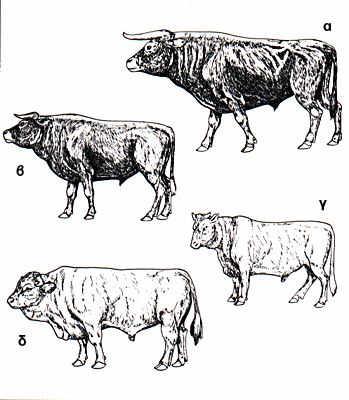http://www.petermaas.nl/extinct/speciesinfo/aurochs.htm

The first ruminants (whereto the aurochs belonged) arose approximately 40 million year ago. Through the expansion of savannas and grasslands on earth, arose about 25 million year ago the on grass-adjusted ruminants. Most old representative of the genus Bos is Bos acutifrons Lydekker, 1898. It is widely accepted that from this species all later species arose. Bos acutifrons lived till in the middle of the Pleistocene still in India. Between 1.5 and 2 million years ago the aurochs descended probably from this species. (Van Vuure, 2003)
The aurochs spread out in the course of the Pleistocene from India to for example Europe. The aurochs arrived through a southern route first in southern Europe, from where it probably went on via central Europe to Russia. The aurochs appeared approximately 700,000 years ago in Spain and the most old remains of the aurochs in Germany dates from 275,000 years ago.

The first ruminants (whereto the aurochs belonged) arose approximately 40 million year ago. Through the expansion of savannas and grasslands on earth, arose about 25 million year ago the on grass-adjusted ruminants. Most old representative of the genus Bos is Bos acutifrons Lydekker, 1898. It is widely accepted that from this species all later species arose. Bos acutifrons lived till in the middle of the Pleistocene still in India. Between 1.5 and 2 million years ago the aurochs descended probably from this species. (Van Vuure, 2003)
The aurochs spread out in the course of the Pleistocene from India to for example Europe. The aurochs arrived through a southern route first in southern Europe, from where it probably went on via central Europe to Russia. The aurochs appeared approximately 700,000 years ago in Spain and the most old remains of the aurochs in Germany dates from 275,000 years ago.



